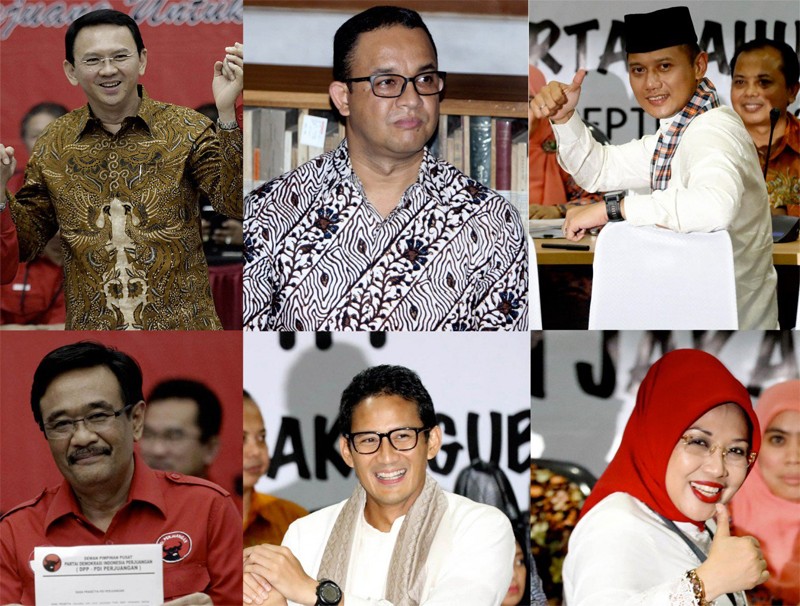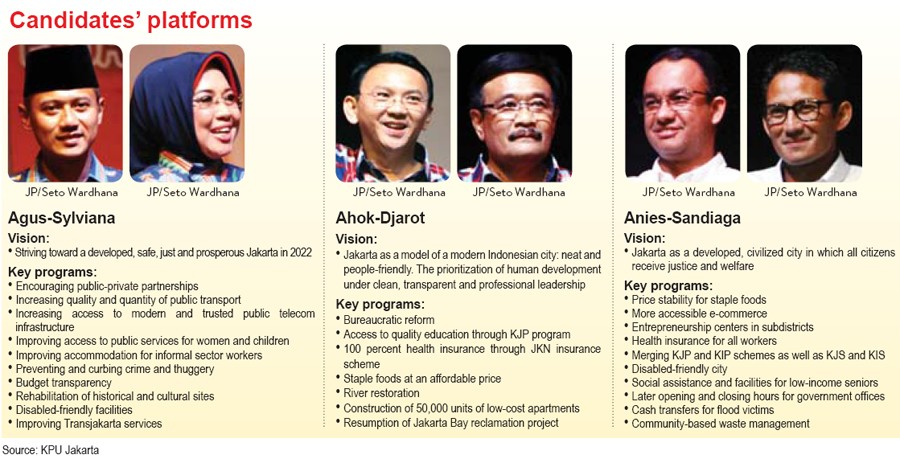Popular Reads
Top Results
Can't find what you're looking for?
View all search resultsPopular Reads
Top Results
Can't find what you're looking for?
View all search resultsAhok’s opponents lack innovative programs
Change text size
Gift Premium Articles
to Anyone
 Pairs of Jakarta gubernatorial hopefuls are ready to compete in the 2017 Jakarta gubernatorial elections. Jakarta governor Basuki "Ahok" Tjahaja Purnama (upper left) is paired with deputy governor Djarot Saiful Hidayat (bottom left), former education and culture minister Anies Baswedan (upper center) is paired with businessman Sandiaga Uno (bottom center) and Agus Harimurti Yudhoyono (upper right) is paired with senior city official Sylviana Murni. (JP/Dhoni Setiawan)
Pairs of Jakarta gubernatorial hopefuls are ready to compete in the 2017 Jakarta gubernatorial elections. Jakarta governor Basuki "Ahok" Tjahaja Purnama (upper left) is paired with deputy governor Djarot Saiful Hidayat (bottom left), former education and culture minister Anies Baswedan (upper center) is paired with businessman Sandiaga Uno (bottom center) and Agus Harimurti Yudhoyono (upper right) is paired with senior city official Sylviana Murni. (JP/Dhoni Setiawan)
D
espite their surprising entry at the last minute of the candidate registration period, the two pairs challenging incumbent Jakarta Governor Basuki “Ahok” Tjahaja Purnama and his running mate Djarot Saiful Hidayat have yet to show off an edge to their campaigns.
In the first few days of their campaign, Agus Harimurti Yudhoyono-Sylviana Murni and Anies Baswedan-Sandiaga Uno have not shown voters that they have better plans for Jakarta.
Agus, who is the son of former president and Democratic Party patron Susilo Bambang Yudhoyono, continues to rely on his father’s charisma by rolling out programs similar to those promoted by the former president during his time in office.
On Sunday night, Agus made his first political speech as a gubernatorial candidate in front of thousands of people, including Yudhoyono, who enthusiastically observed his son speak from the front row.
Agus talked about 10 programs that he would deliver to the city if he and his running mate Sylviana were elected.
At the top of the list is his cash assistance scheme, known as BLT, which was introduced by Yudhoyono when he served as president in 2008 to give aid to marginalized citizens following rises in fuel prices at that time. Under his administration, the government distributed Rp 100,000 (US$7.7) per month to every low-income family through post offices. The households collected their money in cash every month.
The program has been improved upon by President Joko “Jokowi” Widodo’s administration, which has tried to deliver various forms of social assistance through e-money.
“The cash assistance was necessary to raise the purchasing power of Jakarta residents as well as strengthen other social safety nets,” Agus said in his speech, which was welcomed by thunderous applause from the audience.
Agus believes that these policies should be adopted by the next administration as they will reduce the poverty rate in the capital from the current level of 3.7 percent to 2.7 percent within five years. The former military officer is also certain that the Gini ratio coefficient will decline from 0.41 to 0.35 if such a policy were to be implemented.
There is also a commitment from Ahok’s opponents to extend the Jakarta Smart Card (KJP) program, a legacy of Jokowi during his short tenure as the city’s governor before he was elected president.
Intimidated by the popularity of Ahok, opposition political parties negotiated until the final hours of the registration period to decide on their own candidates for the
election.
After failing to form a big coalition to challenge Ahok, the Democratic Party and Gerindra Party announced their own separate candidates, supported in turn by smaller political parties.
While Yudhoyono’s Democratic Party named Agus, Gerindra put forward former education minister Anies Baswedan, who was recently ousted from his post in July.
 (-/-)
(-/-)
Anies, paired with businessman Sandiaga, also aims to continue the legacy of Jokowi by promoting the KJP program and the Jakarta Health Card (KJS).
Anies, however, will tweak the programs. He says he intends to integrate the two local programs with the nationwide Indonesia Smart Card (KIP) and Indonesia Health Card (KIS), launched by Jokowi right after becoming President in 2014.
The cards are basically forms of cash assistance for low-income families, disbursed as e-money.
As education minister, Anies was the executor of the KIP program, which was later criticized for being poorly implemented and distributed.
Unlike the current administration, Anies says he will allow KJP holders and KIP holders to use the facilities of the KIP and the KIS.
“We will not only extend the KJP program, we will increase [the fund],” Anies said.
Experts believe that the candidates are trying to gain more votes by campaigning on popular past programs.
Indonesian Institute of Sciences (LIPI) political analyst Siti Zuhro said Agus wanted to repeat the success story of the BLT program, a program considered by many as crucial to securing Yudhoyono’s popularity with people, leading Yudhoyono to reelection victory in the 2009 presidential race.
“He might see the program as a way to secure the same popularity enjoyed by his father when he was president,” Siti told The Jakarta Post.









